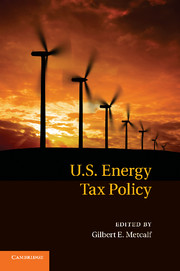Book contents
- Frontmatter
- Contents
- Conference Participants
- 1 Introduction
- 2 Distributional Impacts of Carbon Pricing Policies in the Electricity Sector
- 3 Distributional Impacts of a U.S. Greenhouse Gas Policy
- 4 Instrument Choice Is Instrument Design
- 5 Taxes, Permits, and Climate Change
- 6 Border Adjustments for Carbon Taxes and the Cost of Emissions Permits
- 7 Taxes and Caps as Climate Policy Instruments with Domestic and Imported Fuels
- 8 How Much Should Highway Fuels Be Taxed?
- 9 State Tax Policy and Oil Production
- 10 The Social Costs and Benefits of U.S. Biofuel Policies with Preexisting Distortions
- Index
- References
1 - Introduction
Published online by Cambridge University Press: 01 June 2011
- Frontmatter
- Contents
- Conference Participants
- 1 Introduction
- 2 Distributional Impacts of Carbon Pricing Policies in the Electricity Sector
- 3 Distributional Impacts of a U.S. Greenhouse Gas Policy
- 4 Instrument Choice Is Instrument Design
- 5 Taxes, Permits, and Climate Change
- 6 Border Adjustments for Carbon Taxes and the Cost of Emissions Permits
- 7 Taxes and Caps as Climate Policy Instruments with Domestic and Imported Fuels
- 8 How Much Should Highway Fuels Be Taxed?
- 9 State Tax Policy and Oil Production
- 10 The Social Costs and Benefits of U.S. Biofuel Policies with Preexisting Distortions
- Index
- References
Summary
Anyone interested in understanding U.S. energy policy must begin from the premise that policy seeks to achieve multiple and often conflicting goals. Policy makers, for example, wish to encourage the reduction of greenhouse gas emissions (predominantly carbon dioxide from energy consumption) but at the same time reduce our reliance on oil consumption. Although at first glance these goals appear to be complementary, a leading contender for a replacement for the internal combustion engine in vehicles is a plug-in hybrid, which in turn could lead to an increase in demand for coal-fired electricity. Coal emits the most carbon dioxide per BTU of any energy source and so is a prime target for environmentalists who wish to reduce emissions.
Concerns with climate change, energy security, and pollution associated with the production and consumption of energy top the list of concerns about our use of energy; in addition, there are complex distributional considerations. The damages, for example, from coal combustion for electricity production vary widely across plants, with one recent study suggesting that the damages per kilowatt hour (kWh) from criteria pollutants range from less than 0.19 cents to more than 12 cents (National Research Council 2009). Meanwhile, policies to discourage the consumption of coal could have sharp distributional consequences. Just to focus on one fact, three states – Montana, Wyoming, and Illinois – account for over one-half of all recoverable reserves of coal in the United States.
- Type
- Chapter
- Information
- US Energy Tax Policy , pp. 1 - 9Publisher: Cambridge University PressPrint publication year: 2010



